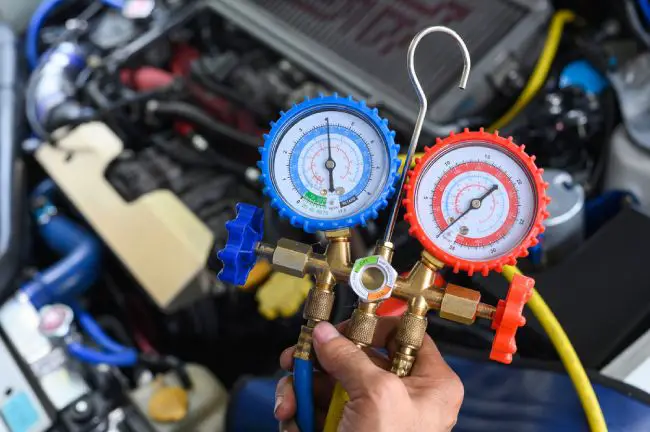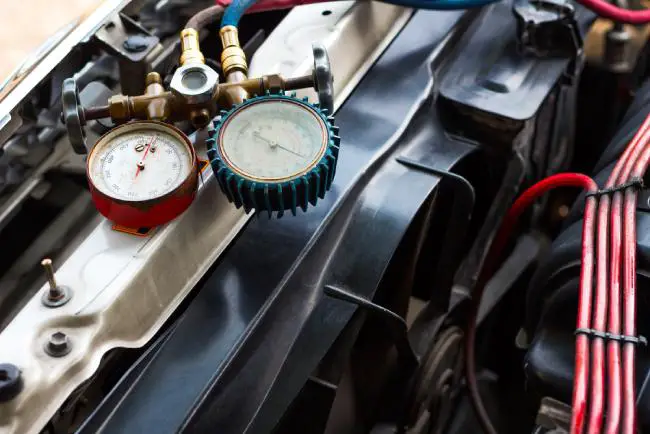The air conditioning unit in your car won’t work when its freon levels are too low. This is not the only problem.
There will be no engagement of the AC clutch since there is insufficient liquid, this means the compressor cannot function. This may not be an obvious sign.
Fortunately, your car will show other symptoms of low refrigerant. Here we talk about them.
What’s freon and what does it do?
Freon is a mixture of chlorine, bromine, fluorine, and a mixture of carbon-hydrogen. Widely used in auto air conditioning systems, these products can be called refrigerants.
The gaseous substance is colorless and odorless at room temperature. When the AC system in a car compresses this, the gas becomes liquid.
Symptoms of Low Freon in Car

1. Air conditioning gauge reading
Connect a high- and low-service gauge to an AC manifold. You need to connect the red gauge hose to the high service port and ensure it is fitted well.
For this, you want to use a quick-release fitting. Make sure the blue gauge hose is connected to the low-side service port.
Turn on the blue and red gauges after the car’s engine and AC are turned off. An ideal reading would be 80-105 psi.
You should read somewhere between 200 to 350 psi on the high side if you do measurements with the AC at the highest setting 25 to 35 psi should be the low side.
You may be low on Freon if your readings are below these.
2. Failed to engage AC clutch
The compressor of your car is pressurized by the clutch. When you turn on the AC in your car, you should hear a clicking sound. When the clutch engages, you hear that sound.
The clutch detects the amount of Freon in the system. The Freon may be too low if it cannot engage.
3. The AC blows hot air
Depending on how far you set the AC, a properly functioning AC unit will blow hot or cold air. The AC blows warm air out of the vents when it should be cold air.
This is an obvious sign that your car’s freon levels are low. In the absence of Freon, the system will not pressurize or circulate.
4. Visible refrigerant leaks
Low Freon in your car can lead to visible freon leaks. The compressor is lubricated by oil contained in freon.
It usually looks like grease in liquid form, only lighter. Check the various parts of your AC system if you suspect Freon is leaking.
Examine the pressure lines, the front shaft, the service ports, the condenser, the accumulator, plus any fittings that attach to the compressor.
If you see a liquid or film in any of these components, you may have a Freon leak.
5. Sight glass
You can also check your sight glass (if your vehicle has one) to see if your car has low Freon. This is a component which you can look in to view the freons movements to see if it is flowing through the line.
You should see a clear fluid flowing through the line during optimal Freon levels. You will notice bubbles when the Freon level is low. There is no Freon in your vehicle if you cannot see movement.
6. Visible bubbles in the liquid
Modern cars often have transparent AC systems so you can see the liquids inside.
There should be no bubbles in the system when there is enough Freon, and the liquid should flow smoothly.
You may need to add Freon to your AC system if you notice the refrigerant bubbling or blurry.
7. Refrigerant loss when driving
When your air conditioner suddenly stops cooling while you are driving, it’s likely a leak in one or more of the unit’s seals, hoses, or fittings.
The area that’s leaking will emit what looks like a white cloud. Sometimes you’ll hear the compressor hissing, and the car will smell like Freon.
8. Ice on the compressor
A compressor with ice on it may indicate low freon levels. The reason is moisture displacing freon. As freon levels drop, the system begins to malfunction.
A frozen layer of moisture occupies its place in the system.
Tools Required to Check Freon Level in Car
- Refrigerant with gauge
- Thermometer
- Protective glasses
How to Check the Freon Level in Your Car?

Step 1: Connect the service ports to the gauges
First, you need to check the pressure. On the passenger side of the engine bay, you’ll find the low-pressure service port.
Now connect the recharge hose but avoid pulling the trigger for the refrigerant because the freon can leak into the atmosphere.
Step 2: Set the air conditioner max a/c
The next step is to start your vehicle, turn the AC as high as possible, and monitor the gauge.
It is essential to recharge the AC system if the reading is lower than 40psi.
Finally, pull the trigger on the can of refrigerant after attaching it to the hose.
Step 3: Read the gauge
Make sure that you don’t overcharge the system by holding the trigger for 10 seconds and checking the gauge once you’ve released it. The AC system is overcharged if it reads more than 40 psi.
In the event that the gauge readings exceed 40 psi, you should contact your mechanic. You can check the temperature inside your vehicle if that is not the case.
A temperature of approximately 40 degrees Fahrenheit should be present near the ventilator if the AC system is working properly.
What Happens if You Put Too Much Freon in a Car?
The compressor in the air conditioning system may malfunction if there is too much Freon in the car. It will run less smoothly and may not even start if you have too much refrigerant.
Run a pressure check on the high and low-pressure lines of the AC system to see if there’s too much Freon.
FAQs
1. How often do I need to replace freon in a car?
Ans: A working AC system will require no Freon replacement. You will not need to replace Freon unless you run into a problem because it is not combustible like gas or oil. You may need to replace Freon if your AC system develops a leak, when the levels drop too low, the system will fail.
2. Is it bad to run ac with low freon?
Ans: The parts of your air conditioner that require the right refrigerant level to work properly will not continue to function if you run the unit with low refrigerant levels.










Leave a Comment